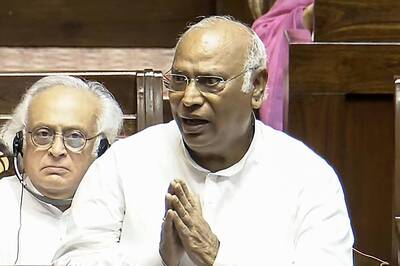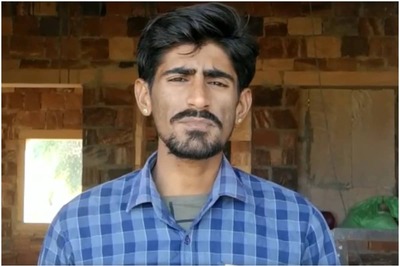
views
Karan Thapar: Hello and welcome to Devil's Advocate. What is the Government's position on reservations in the government sector and how does it respond to the concerns of industry - those are the two key issues that I shall raise today in an exclusive interview with the Minister of Industry and Commerce Kamal Nath.
Minister, lets start by establishing the government's position. The UPA's Common Minimum Programme says that the UPA government is very sensitive to the issue of affirmative action including reservations in the private sector. Is that a commitment to reservation or is it a commitment to affirmative action? Which is it?
Kamal Nath: It is a commitment to all inclusive growth. We must recognise that in our country, when we are on this growth trajectory - like never before - this growth cannot be urban-centric, class-centric or region-centric. We have to ensure all-inclusive growth.
Karan Thapar: Quite right, I accept that. All inclusive growth in fact has to be a priority for any government, but the problem is that the language of the Common Minimum Programme talks about affirmative action including reservation and industry wants to know - Is that a commitment ot affirmative action or is it a commitment to reservation?
Kamal Nath:It is a commitment to affirmative action, which does not preclude reservation.
Karan Thapar: So, it is a commitment to both.
Kamal Nath:We want the industry to respond to this concept of all inclusive growth because if industry does not respond - let me make this very clear - in the long term, it will pay a price for it because we are a democracy.
Karan Thapar: Absolutely, so what you said now - I am repeating it for clarity - It is a commitment for affirmative action, including reservations.
Kamal Nath:Which does not preclude...
Karan Thapar:Which means it is a commitment to both.
Kamal Nath: It is a commitment to move forward and that is in terms of the larger objective which the government has. And it is not objective; I believe it is an imperative.
Karan Thapar: As Industries Minister, what you are therefore saying to me is that reservations, is a sense, is on the agenda and it could be implemented because your commitment is to affirmative action with does not preclude reservation.
PAGE_BREAK
Kamal Nath: Let me say what I am saying rather than me trying to say what you are saying. Our commitment is to affirmative action. Why? Because we have to ensure there is all inclusive growth in all sections of the society. If there is no other way out and if the industry does not respond.
Karan Thapar: I'll come to the question of why affirmative action is necessary in a moment's time because I am very keen to explore that with you. But at the moment, what I want to clarify is the point that you made that it is a commitment to affirmative action, which does not preclude reservation.
Kamal Nath:Absolutely.
Karan Thapar: Therefore, reservations are included in affirmative action.
Kamal Nath: Certainly. Because if, we want all inclusive growth, if there is no alternative to all inclusive growth, then reservations will have to happen.
Karan Thapar: Let me quote to you what Jawahar Lal Nehru wrote on the 27th of June 1961 to the Chief Ministers of that time. He said, "I dislike any kind of reservation. If we go in for reservations on communal and caste basis, we will swamp the bright and able people and remain second rate or third rate." This way, he added, "Lies not only folly, but also disaster."
Kamal Nath: And when was that?
Karan Thapar: 1961.
Kamal Nath: And where are we today in 2006. What Jawahar Lal Nehru said at that time was very correct. But when, over these last 50 years, something is not happening, it is imperative for us to address it. There are many things, which have not happened. Now, we have to priorities and we must recognise that it is not the government recognising it, I think that every single citizen, every single person in the industry must recognise that unless India has all inclusive growth, which includes growth and development reaching out to all sections of the society.
Karan Thapar: You are saying that because in the last 45 years, since Jawahar Lal Nehru spoke in 1961, India hasn't has the all inclusive type of growth which you want, therefore reservations has become a central issue and therefore, what Jawahar Lal Nehru disliked has become necessary today. And that is why you are prepared to go against Jawahar Lal Nehru.
Kamal Nath: We are not going against Jawahar Lal Nehru, what are you talking? It is in 61 that you are talking about. And I am saying what has not happened since 61.
Karan Thapar: Had he been alive today, would he have been in favour of reservations?
Kamal Nath: I don't want to say what would he have done if he had been alive. But Jawahar Lal Nehru stood for all sections of the society and if you are going to say that because he said that at that point in time, if what he had envisaged, his vision, you cannot take that in isolation. You are bringing his vision in here.
PAGE_BREAK
Karan Thapar: A second issue which I want to clarify with you is the affirmative action which does not preclude reservations, who is it principally targeted at? Is it strictly for the Scheduled Castes and the Scheduled Tribes or does it also include the OBCs?
Kamal Nath: It includes all sections of the society which need to be uplifted.
Karan Thapar: Does that include the OBCs?
Kamal Nath: Of course, when we say 'all sections of the society', it includes all sections of the society.
Karan Thapar: You are talking about affirmative action and reservations, is it specifically for SCs/STs and OBCs?
Kamal Nath: I am talking about all sections of the society which have not had a chance to partake in the growth process of this country. Now, do you know how many districts there are which have more than 33 per cent or 50 per cent of SCs/SCs or OBCs? There are 104 disricts.
Karan Thapar: What? Only SCs and STs?
Kamal Nath:That's right. Yes, but if you were to add OBCs in this, then...
Karan Thapar: Lets come to the districts in a moment's time, lets first clarify the government's position. You have made it clear that the government is for affirmative action, which does not preclude reservation; you have made it clear that this would be targeted at SCs/STs and OBCs because you feel that all these people are in need. So far as you are talking about affirmative actions as opposed to reservations, are you talking of voluntary affermative action or are you talking about a legislative action as it happens in South Africa.
Kamal Nath: Our Common Minimum Programme is very clear. When you are using the word affirmative action, we have called upon the industry to tell us how they propose to do it. I keep repeating it.
Karan Thapar: Just tell us if it is voluntary or will be legally enforced.
Kamal Nath: First we want to try the voluntary process. If it does not work then the government will have to look at it. We will then have to look at other options.
Karan Thapar: So you are saying that first we want to try voluntary action and if doesn't work then the government will look at other options.
Kamal Nath: We want to see what the voluntary proposal of industry is. If the government sees that it is working then we will definitely go ahead with it. If it doesn't work or the proposal is not workable then obviously it is not on.
Karan Thapar: In other words whether it is voluntary or legislative will depend upon the response you will get from the industry. If the industry gives you a package that you think is sufficient and that they will enforce it effectively and voluntarily then it will remain voluntary.
Kamal Nath: Absolutely, because we have to achieve our objective.
Karan Thapar: But if you feel that the package you get from the industry is not effective or that it is not going to be enforced voluntarily and effectively then it will it be enforced legally.
Kamal Nath: Then the government will have to look at other options. And other options include the legal channel. But that is not the only option.
PAGE_BREAK
Karan Thapar: So what you are saying is that what we end up with depends critically on what you get from the industry.
Kamal Nath: What we end up with depends critically on whether it encompasses our objective of all inclusive goals.
Karan Thapar: You have clearly established the government's position. How do you know that corporate India isn't doing what you are asking for? Companies like Hindustan Lever, Ashok Leyland and Bajaj Auto say that even today more than 50 per cent of their staff comes from SCs/STs and OBCs. If that is the case then they are doing what you want.
Kamal Nath: Then why are they not coming up with that.
Karan Thapar: Well they have come up with that.
Kamal Nath: So if they are doing it then they should say please enforce it because they are already doing it. Then why should anybody resist it?
Karan Thapar: It is not just the three companies that I mentioned. The President of CII R Seshasayee says that the majority of companies in the manufacturing sector already employ up to 35 per cent of their work force from backward classes.
Kamal Nath: Problem is solved.
Karan Thapar: In the services the figure is even higher. And you say problem solved.
Kamal Nath: If they are saying that we are already doing it then they should in fact come to government and say make it mandatory because they have to do nothing more.
Karan Thapar: But you dont need to make it mandatory because if they are already doing it voluntarily, in fact your problem is solved.
Kamal Nath: Why should there be resistance if they say "we are already doing it".
Karan Thapar: There is something very interesting what you are saying, You have called for a certain type of response from industry, affirmative action, which does not approve reservation and yet it now emerges that industry is already doing what you want them to do. So did you not know the position?
Kamal Nath: We know the position but what the position is very inaccurate is that our growth. If you see our growth in the last 10 years has been very largely urban centric and let me tell you this for districts, like my own districts in Chhindwara, why the growth. So I am not going to look at the urban centres. I am going to look at the districts of my country.
Karan Thapar: Lets stick to the issue I am raising and will come to the growth in a moments time. What I am saying to you is that industry claims that they are already doing what the government wants them to do.
Kamal Nath: Let them substantiate their claims. I don’t want a sweeping statement. If they say it, let them say it on facts and figures.
Karan Thapar: You say you want facts and figures. You want industry to substantiate it. May be industry will take up your challenge and substantiate it. Let me however quote to you Government figures, which prove that industry is doing exactly what you want. The NSSO 1999, which is the most recent of the NSSO studies available, conclusively shows that the share of SCs, STs and OBCs in employment is exactly proportional to their share of the population.
Kamal Nath: So what is the problem. What is the point of making?
Karan Thapar: But then why are you raising this demand.
Kamal Nath: We are not raising this demand. This is our objective. It’s not a demand.
PAGE_BREAK
Karan Thapar: But your objectives are achieved. You don’t need to make it an objective.
Kamal Nath: The government is responsible to the people of the country. We have to respond to every sections of society. So where is the problem if they are doing it. I would say if you are doing something you are doing in any case then you would come back and say please make it mandatory because we are doing it.
Karan Thapar: The reason why this issue emerges is because the Prime Minister at the CII conference in April specifically called upon industry to make itself more representative of Society. He called upon industry to take affirmative measures to make its employment more representative of the profile of the society. I am now saying it to you that not only these industries already doing it but your figures NSSO 1999 prove that there are. So there was no need for the Prime Minister to make this call.
Kamal Nath:I really think that in industry, as you said, I am industry's minister and industry has not told me this. They may have come and told you this but they have discussed this with me.
Karan Thapar: Even if industry has not told you this, the NSSO is the government organisation NSSO 1999 are government figures, are you not aware of them?
Kamal Nath:I am aware of them. But in what context is it. I really don’t think there is any confusion in this. My context is that growth and development is to be all inclusive. You take one district and you say this is happening. Is it happening everywhere?
Karan Thapar: Yes these NSSO figures are nationwide.
Kamal Nath:Your figures are inaccurate.
Karan Thapar: They are not my figures, they are your figures.
Kamal Nath:That’s what you are saying.
Karan Thapar: They are the national sample survey figures 1999. They are available from the government. They are authenticated by the government. They are disseminated by the government.
Kamal Nath:That's what you are saying.
Karan Thapar: That's not what I am saying, that's what the government is saying.
Kamal Nath: That's what you are saying what the government is saying. That's not what I am saying and that's not what NSSO saying.
Karan Thapar: It seems that you don't know the NSSO figures.
Kamal Nath: It seems to me that what you read, you do not reflect in the context in which it is.
Karan Thapar: When you distrust the NSSO figures ....
Kamal Nath: I am not distrusting NSSO figures. Do you think the government is off its head? We have been winning elections.
Karan Thapar: Well, I am not sure if the government is off its head. I won't presume to make the judgment. But I am indicating to you that when the Prime Minister makes a call on the industry to make its profile more representative of society, he seems to be unaware of the fact that industry is already doing it. And your figures prove it.
Kamal Nath: Certainly not. Our figures do not prove it.
Karan Thapar: Your figures do not prove it? So you are dissociating yourself from NSSO?
Kamal Nath: I am not dissociating. Our figures do not prove it. I am the industry minister. I am telling you on record our figures do not prove it, Finished.
Karan Thapar: So what are you saying about NSSO? That is wrong?
PAGE_BREAK
Kamal Nath: I do not know. You are quoting the figures. I don't have the NSSO figures in my pocket. But I must tell you we have done a district-wise study in the country. And we are doing this all the time.
Karan Thapar: Let me put to you what the vice-president of CII, Sunil Mittal, said to us last week. He said the industry is regarded with the false impression. Industry, he said, is a victim of prejudice. Is government and the manner in which today you are responding to industry part of that prejudice?
Kamal Nath: There is no prejudice. I think there has never been a better partnership between government and industry as that is today. They keep saying that at every forum.
Karan Thapar: All right. You talk of the partnership. Let me quote to you something else that Sunil Mittal said. He said regardless of what the industry was already doing today to help the weaker sections, nonetheless he personally believed that it had a moral commitment and duty to do more. He actually said it and I want to quote to you. He said, "This is something the industry must have right in front of their agenda." As industry minister, how do you respond to that suggestion?
Kamal Nath: I respond to it very well. And industry has met me. They are meeting me all the time.
Karan Thapar: Is this the sort of thing you are looking for?
Kamal Nath: We are looking at industry participating also feeling the need that growth cannot be isolated. Growth cannot be sectional. We have been articulating this all the time. And I see industry is now coming out with a positive response. Whether the response is adequate on the ground is to be seen.
Karan Thapar: All right. That's the interesting thing -- whether the response is adequate is to be seen. Sunil Mittal in the same interview that I am quoting said to us last week that he appeals to government to give industry two years so it can prove itself before legislative measures are imposed upon it. Again, I want to quote from him. He said, "Give us a chance to prove that we mean business." Are you prepared, as industry minister, to give industry two years to prove that they can do it on their own voluntarily?
Kamal Nath: Well, if they come and they say what is the kind of business they mean, we are willing to look at it. But, we cannot be talking of what he tells you. Government cannot be responding to what statements he makes here and there.
Karan Thapar: Perfectly correct.
Kamal Nath: If he comes, if industry comes on a formal format with proposals, which are positive and we consider adequate, which are going to work. We will work.
Karan Thapar: Then you are prepared to give them the two years that they ask for?
Kamal Nath: It depends on what it is. I may decide to give them two months. My point is this: We have to see what is there. There is no use starting a question with an 'if'.
PAGE_BREAK
Karan Thapar: Quite right. The catch is, let us know what you intend to do. Then we will decide whether we can give you the two years to do it or not?
Kamal Nath: Absolutely.
Karan Thapar: So once again, the initiative lies with the industry.
Kamal Nath: Yes, the initiative lies with the industry. Because that is a part of our common minimum programme.
Karan Thapar: Minister, you have ideas that you are yourself trying to bring up as Minister of Industries to encourage industry to do more for the weaker sections and I believe you think that the real secret lies in incentivising industry. Is that correct?
Kamal Nath: That's correct. I have looked at what is our growth pattern. Where are investments growing. Where is manufacturing taking place. Where is employment opportunities taking place. And when we look at the map in that, we see that there are large number of districts where nobody goes. Where nobody wants to go. Because they look for areas where there is infrastructure. Now, nobody puts up infrastructure where there is no industry. It's a chicken-and-egg situation.
Karan Thapar: For these districts where nobody goes, do you have a particular population profile that would actually meet your reservation requirements?
Kamal Nath: Of course. If there is captive area, if there is a district with high ST/SC and OBC population, and we incentivise industry to go there and set up industry there, to invest in that district, the captive area that they get to employ will be amongst those people.
Karan Thapar: If I am right, I believe there are 124 districts where ST/SCs constitute over 40% of the population and there are 104 where they constitute over 50% of the population. So those are the districts where you tell the industry to go and set up and in return you are offering incentives to encourage them.
Kamal Nath: Well, out of these, there are 50-odd districts you can take out, which are already under special packages -- our Northeastern package, our J&K package.
Karan Thapar: So there are 50 left which are under no packages?
Kamal Nath: About 50 to 60, I don't remember the exact figure. So, we say, what I am looking at is if we can incentivise industry to go to ST/SC and OBC districts to invest and we incentivise on employment. If they say we are going to put our Rs 100 crore and employ 20 people, it doesn't serve my purpose. I want them to create employment opportunities.
Karan Thapar: Tell me, what sort of incentives are you offering them to encourage them to go there.
PAGE_BREAK
Kamal Nath: Well, I am not offering them anything. I am looking at possibilities.
Karan Thapar: What sort of thing you are considering?
Kamal Nath: Well, I am looking at, what the government is considering, is how do you incentivise an industry which goes to such a district and create employment.
Karan Thapar: You are talking of tax concessions?
Kamal Nath: Obviously, concessions can only be. What cannot be spiritual? They have to be fiscal. And if they are fiscal and financial, what do you look at if you want employment? You look at that if you employ so many people, you will get a bigger benefit than what you will do anywhere else.
Karan Thapar: So you are talking of tax concessions, excise holidays, land subsidies -- in other words financial measures that would be in industry's own advantage to take and in return, you are saying, employ a certain percentage of ST/SCs.
Kamal Nath: Investment has to be attracted. What will attract investment? Where there is a greater viability. Now, somebody will come to Chhindwara, if he feels that here he can get less financial burden.
Karan Thapar: In other words, you are appealing to the self-interest of industry and in return you are saying please employ a certain fixed percentage of ST/SCs.
Kamal Nath: Well, industry is there for investment and investment is there for a return. There is no question of self-interest. Everything is based on self-interest, right? So, we need to make them attractive for them to reach out to those districts, which they do not consider.
Karan Thapar: These incentivised policy that you have just told me about, will they be part of a new policy package that you are about to announce?
Kamal Nath: We are looking at working on some possible alternative that we want a policy which attracts investment and employment generation in certain districts.
Karan Thapar: When will you formally be in a position to announce as policy the ideas we are discussing today?
Kamal Nath: At the moment, it's still in a formative stage. Then we are going to circulate it. We have got to discuss it with various other ministries of the Government of India. It's go to be approved by the Cabinet. I want to discuss it also with the industry associations. Because there is no use having a policy which they won't buy.
Karan Thapar: What is the chance that you Cabinet colleagues, many of whom have already as individuals committed themselves to reservations, perhaps by constitutional changes, will accept what you are suggesting?
Kamal Nath: I don't know. I mean if it's rationale and whatever I propose works, there is logical end and it has got an economic sense and it makes social sense, why should anybody not accept it. Everybody there is reasonable.
PAGE_BREAK
Karan Thapar: Except for the fact that this would be leaving industry to do things in their own best interest whereas many people in the Cabinet think that industry needs to be forced to do it. Left on its own, the industry won't do it.
Kamal Nath: Well, you must understand that today, interest of industry and interest of the government converge a lot. Because industry creates employment.
Karan Thapar: You understand. But do your Cabinet colleagues?
Kamal Nath: Of course, my Cabinet colleagues understand.
Karan Thapar: Ram Vilas Paswan, Meira Kumar?
Kamal Nath: Of course, they understand.
Karan Thapar: They are determined in favour of reservations, maybe by Constitution change.
Kamal Nath: They understand that. Why are they saying reservations? Because they are seeing no other alternative.
Karan Thapar: You are offering another alternative.
Kamal Nath: Let it be seen. They feel in the end of the day it's not the process, in the end of the day it's what meets the objective better.
Karan Thapar: Then you are saying one thing else as well. You are saying that something that will help you convince your Cabinet colleagues is if industry responds positively to your ideas. Then you will be able to say that look, here is the clever idea, here is the response, accept it.
Kamal Nath: What I am saying I am very clear. That we need to incentivise. And if we can incentivise it and provide adequate attractiveness, I don't see why industry shouldn't do it.
Karan Thapar: Is the Prime Minister in agreement with your thinking?
Kamal Nath: I have not discussed with him.
Karan Thapar: At all?
Kamal Nath: No. Broadly, I have told other Cabinet colleagues that we are looking at various alternatives.
Karan Thapar: But do you have any indication that the Prime Minister believes that this could be the right way of handling it.
Kamal Nath: No, I have no indication.
Karan Thapar: So, you might discover that in fact the Prime Minister didn't like your idea at all.
PAGE_BREAK
Kamal Nath: Well, absolutely likely. It can also be that even the Cabinet doesn't like it. But I normally don't come up with proposals, which others don't like.
Karan Thapar: So, this is an instance where Kamal Nath is coming up with a proposal which he believes make sense from all points of view and you are prepared to a very good extent to stick your neck out because you think this is a sensible thing to try out.
Kamal Nath: There is no sticking my neck out. It's in pursuance of our government's policy. Why do I stick my neck out? I want all-inclusive growth. Industry says we must have all-inclusive growth. So here let's go about it and have it. How do you want it? I enable you.
Karan Thapar: One last question. How confident are you that you will get Cabinet support behind this idea?
Kamal Nath: I am confident that we will come up with a proposal which generates employment in areas where there is no scope. Obviously, people are going to like it.
Karan Thapar: Kamal Nath, a pleasure talking to you on Devil's Advocate.




















Comments
0 comment